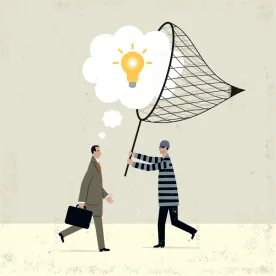Earlier this year, we covered the notable trade secrets verdict in Versata Software Inc. v. Ford Motor Co., No. 2:15-cv-10628 (E.D. Mich. Oct. 26, 2022), in which Versata was awarded $105 million for breach of contract and misappropriation of trade secrets claims against Ford Motor Co. However, on May 1, 2023, the U.S. District Court for the Eastern District of Michigan significantly reduced the awarded damages. This post examines the Court’s decision and the key takeaways regarding the calculation of damages in trade secret and restrictive covenant claims.
Background:
In the original verdict, the jury found Ford liable for misappropriating software developed by Versata, which Ford used to manage vehicle assembly. The jury awarded Versata $82.3 million for Ford’s breach of contract and $22.4 million for Ford’s misappropriation of Versata’s trade secrets.
Notably, for Versata’s trade secrets-related claims, the jury was asked to consider an unjust enrichment theory of damages known as “avoided costs,” or the costs a misappropriator avoided by taking the completed trade secret instead of developing it themselves. Under this theory, the jury found Ford liable for costs it “avoided” by misappropriating Versata’s trade secrets.
Revised Verdict:
On May 1, 2023, Judge Matthew F. Leitman of the U.S. District Court of the Eastern District of Michigan reduced the jury’s $82.3 million contract damages award to just $3 in nominal damages and eliminated the $22.4 million verdict for misappropriation of trade secrets.
The Court ruled that the excessively high damages award would overcompensate Versata rather than putting Versata in the position it would have occupied had Ford not breached the contract. The Court also determined that Versata did not present sufficient evidence for the jury to determine its contract damages with reasonable certainty. The Court underscored that Versata had not presented any expert testimony on contract damages during the trial, nor had any witness testified about Ford’s willingness to pay $17 million for a contract extension before the breach.
As for the trade secret misappropriation award, the trial Court instructed the jury that any award of trade secret damages “must be limited to the amount of time you decide it would have taken Ford to independently develop the alleged combination trade secrets you found were misappropriated.” The Court overturned the verdict, stating that Versata failed to present sufficient evidence as to how long Ford would have taken to develop any of the misappropriated trade secrets. The Court found that Versata’s damages expert employed an “all-or-nothing” approach to damages calculation, which only provided the jury with a calculation that assumed Ford misappropriated all of the trade secrets. The Court noted the risks in “bundling” alleged trade secrets damages and concluded that the jury had no basis for a damages calculation as no evidence was presented on how to how to calculate damages for each trade secret individually.
Key Takeaways:
The substantial jury verdict’s reversal highlights the importance of calculating damages with precision when pursuing trade secret or restrictive covenant claims. Although the “avoided costs” doctrine is gaining some traction, this ruling demonstrates that courts may not accept unsupported or imprecise estimates of damages, even when juries determine that trade secrets have been misappropriated.





 />i
/>i

